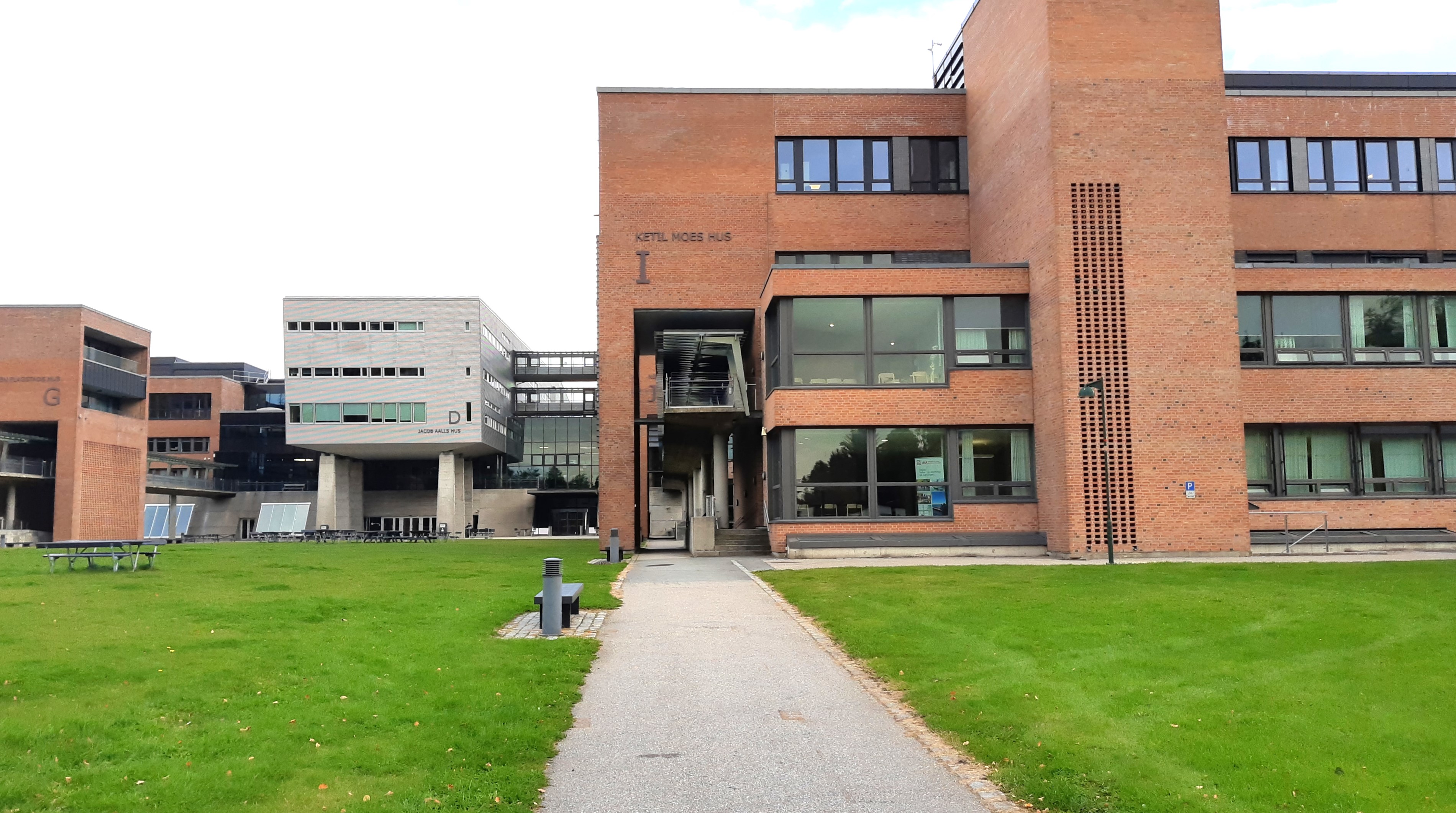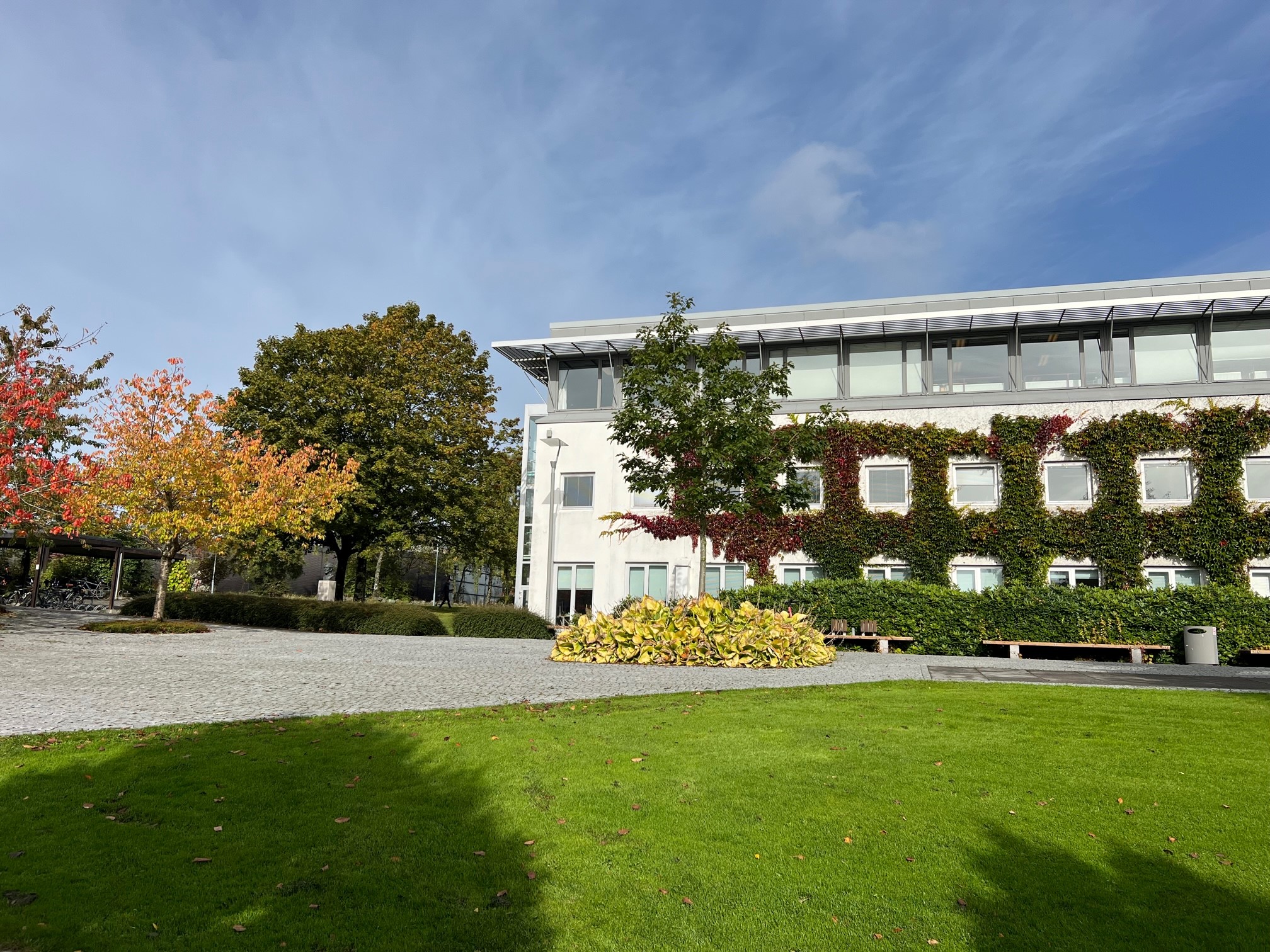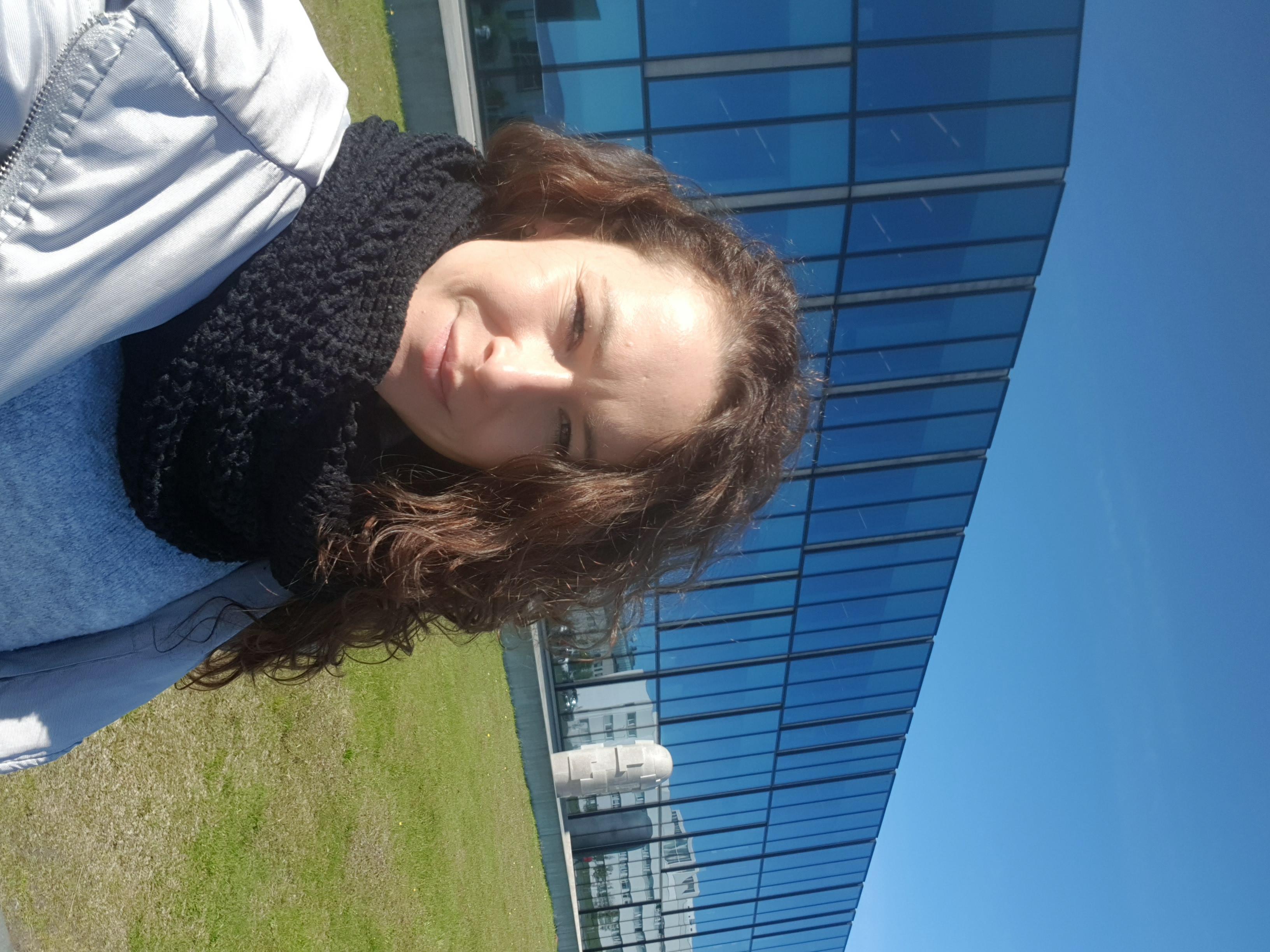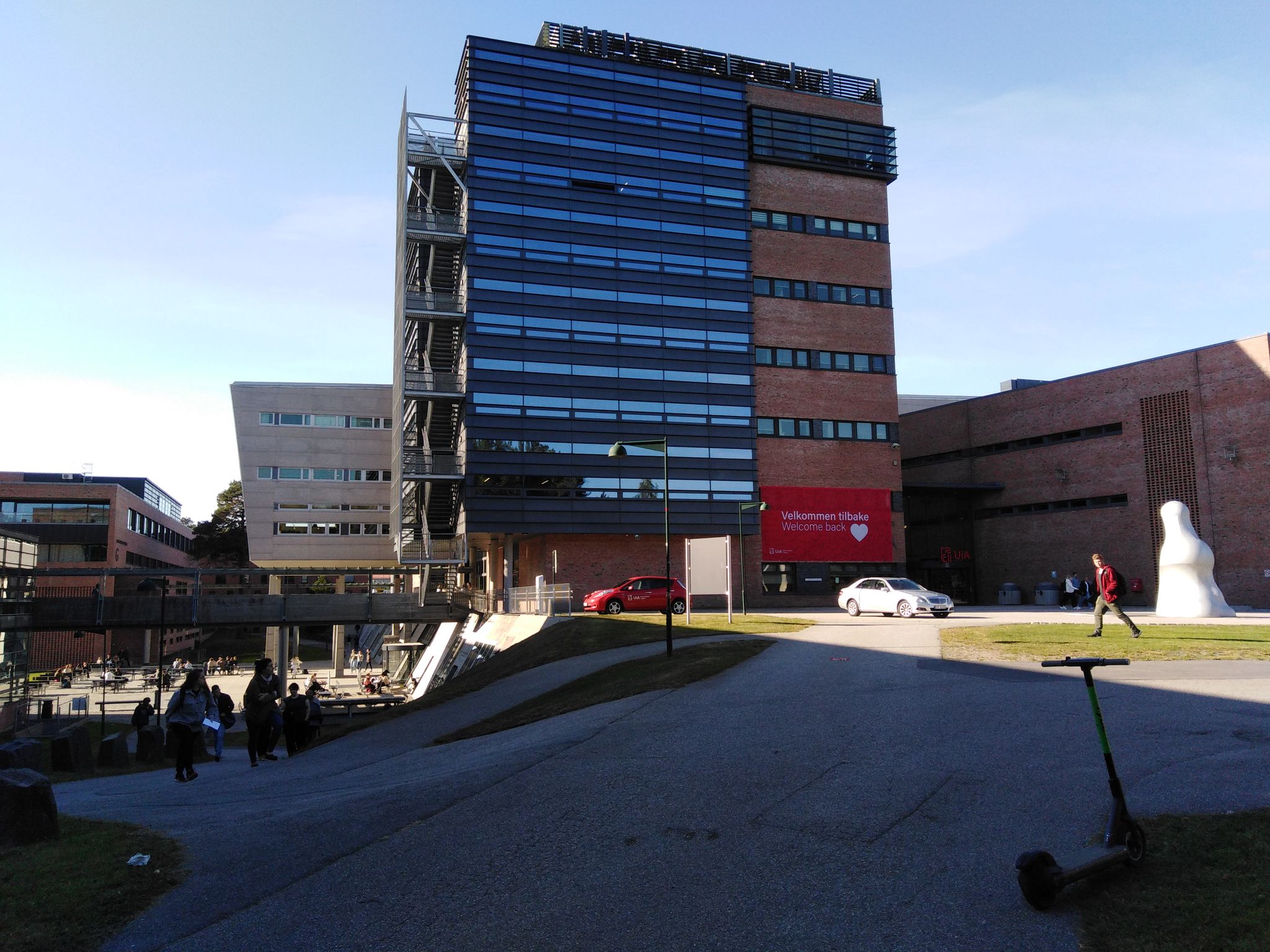Główna nawigacja

Find out more about the mobilities under the Education Programme.
mgr Monika Dziąg, the Vice-Rector for Student Affairs' office
Staff Mobility forTraining at University of Agder, Norway
In September 2023, I took part in a training trip within the Education Programme. I visited the University of Agder in Kristiansand, in the south of Norway.
The University of Agder comprises two campuses: the Kristiansand Campus in Kristiansand and the Grimstad Campus in Grimstad, 45 km away.
UiA is a university, so technology and engineering is only one of the faculties. There are a total of 13,500 students at UiA in seven faculties, including 100 full-time international students, 500 exchange students and 300 foreign academics. Saying 'including' here is not just a prepositional phrase: you can hear English everywhere: in the canteen (serving several vegetarian dishes to choose from each day), in the library, in the common spaces. People from abroad do not live in an aquarium, separated from the rest. They are an organic part of the fabric of UiA. Professor Alfred Christy, who was the contract coordinator on the Agder side, came to Norway from Sri Lanka to do his doctoral studies at the University of Bergen. Hiring doctoral students is a major way of attracting international staff.
Due to the fact that for many years my work duties have been related to student affairs, I wanted to find out how, in general, students at UiA study and live, how student organisations, student government, etc. function in Agder.
I did not manage to achieve all my goals. However, I would like to share three valuable practices observed at UiA.
The first is studentombud, or student trustee. Employed by UiA, reports to no one at UiA in an official capacity. He/She provides advice and support to students from all universities across the region, not just UiA.
The second is the MatRIC drop in, which is free help with maths without making an appointment. Students are helped by other students, who also benefit as they learn how to teach students to learn.
The third is the Writing Lounge. Again, without the need for an appointment, students and staff can get help, in this case, with all aspects of academic writing.
Obviously, apart from the opportunity to get to know the university itself, the Education Programme mobility also allowed me to get to know well the beautifully located Kristiansand, as well as to visit Oslo. While in the latter, one cannot miss a visit to the Munch Museum, which allows us to learn more about the work and the author of the famous "The Scream" painting. A temporary exhibition of Alice Neel's paintings is currently still on display there. This American painter specialises in portraits, on the premise that every person is a new universe.
Every person, but also every place, although superficially it may seem to fit into the familiar one, is a 'new universe', if only we give ourselves the chance to adopt this perspective. Mobilities within the exchange programmes certainly facilitate this.

mgr Agnieszka Michałowska - Dutkiewicz, dr inż. Agata Kaczorowska, Project Services, TUL
Staff Mobility for Training at University of Stavanger, Norway
On 26-28 September 2022, together with my colleague, I paid a visit to the University of Stavanger in Norway.
Objectives of the mobility:
-learning how to promote international projects among academics
-finding out the principles of implementing international projects at the University of Stavanger, taking into account good practices in the area of international project management,
- learning about and exchanging good practice in the field of engaging industry in project collaboration,
- exploring opportunities for cooperation within the EEA.
We had the opportunity to learn about the specifics of the project team work, listen to presentations and see what daily work is like at the University of Stavanger. We were able to visit, among others: HR Department, Research Department, International Office, Innovation Department, and Health Campus. We also took part in the weekly International Office meeting and a discussion on the possibilities of cooperation within the ECIU and the SEPO joint structure, as well as the New European Bauhaus, Stavanger lighthouse (NEB STAR) and SMART-ER (ECIU) projects.

mgr Julia Skrzypkowska, the Career Office
Staff Mobility for Training at University of Iceland, from 30 May to 3 June, 2022.
On a daily basis I support students, graduates and staff of Lodz University of Technology (TUL) in the development of entrepreneurial thinking, creation of start-ups and also in personal development focused on mastering soft professional competencies.
Mobility within the Education Programme is a great opportunity for broadening perspective on challenges which are posed by my university. The possibility of observing the best solutions at foreign universities inspires me to create better and better support programmes for my clients. Especially, the area of innovation and support mechanisms for start-up teams requires constant thinking outside the box. For me, getting to know various strategies arising from cultural differences and priorities is an incredible experience and it probably breaks my thinking patterns at most.
During my stay at University of Iceland, the established support system for startups made the biggest impression on me and the way the University cooperates with incubators and businesses or even the city council. Actually, all these entities created a simple and centralized acceleration process, in which the support elements are applied at particular levels. Thanks to mobility, I built a network of contacts which I can share with and use to support my clients even better.
Personally, I think that participation in this kind of mobilities at my workplace, for which development is a core value, is an essential element of professional growth.

prof. Tomasz Wiktorski, Professor of Data Science, University of Stavanger
Staff mobility for teaching at Lodz University of Technology, 9-13 May, 2022.
Mobility is an essential part of academia. Exposure to different educational practices, backgrounds, and expectations is the key to not only progress but also maintenance of quality and relevance in teaching.
A week-long guest lecture arrangement can be easily fitted in even the busiest calendar. At the same time, it provides a necessary stimulus for reflection and renewal.
I am thankful for the opportunity to visit Lodz University of Technology in May 2022, thanks to support from EEA Grants. It was refreshing to experience a different group of students in a different classroom and their reaction to the material I presented. This gave me a new perspective on the best way to introduce and demonstrate it, what will benefit other students in future.
prof. dr hab. inż. Dawid Stawski, Institute of Material Science of Textile and Polymer Composites
Staff mobility for teaching at the University of Agder in Norway, 13-17 September, 2021.
A factor that can effectively shake the lecturer’s attachment to tedious routine expressing itself in the repetition of the well-established method of presenting the content of the course is staff mobility for teaching abroad. Presenting the material to another group of students in a foreign language requires reviewing the content of the lecture, which in turn leads to refreshing and updating the material.
Another interesting skill that is especially improved during delivering a course abroad is the ability to react immediately to the changing situation in the group.
A very important element of the foreign lecture process is something that practically does not exist in the normal, traditional mode, but is common abroad. Namely, these are questions and discussions after the lecture. This is an invaluable feedback that cannot be obtained by any other method than by talking to the student. When the material strikes the new audience as a separate, specific, additional topic, a field for discussion opens that does not actually exist in the standard approach, according to which a lecture is just a normal stage in the process of obtaining credits for graduation.
Summing up, the possibility of delivering lectures abroad within the staff mobility for teaching creates a great opportunity for improving the didactic skills. Also, it drives the process of continuous improvement of the material and supplements the competences with new skills, practically impossible to obtain in a traditional way in day-to-day work situations. In addition, there are numerous benefits related to dealing with cultural and social differences, as well as opening irretrievable opportunities of initiating and developing scientific collaboration.
Such experiences should be described as extremely valuable.


